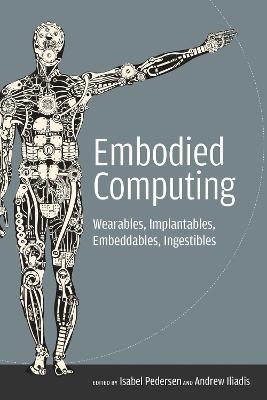
Embodied Computing
Wearables, Implantables, Embeddables, Ingestibles
Seiten
2020
MIT Press (Verlag)
978-0-262-53855-8 (ISBN)
MIT Press (Verlag)
978-0-262-53855-8 (ISBN)
Practitioners and scholars explore ethical, social, and conceptual issues arising in relation to such devices as fitness monitors, neural implants, and a toe-controlled computer mouse.
Body-centered computing now goes beyond the "wearable" to encompass implants, bionic technology, and ingestible sensors-technologies that point to hybrid bodies and blurred boundaries between human, computer, and artificial intelligence platforms. Such technologies promise to reconfigure the relationship between bodies and their environment, enabling new kinds of physiological interfacing, embodiment, and productivity. Using the term embodied computing to describe these devices, this book offers essays by practitioners and scholars from a variety of disciplines that explore the accompanying ethical, social, and conceptual issues.
The contributors examine technologies that range from fitness monitors to neural implants to a toe-controlled mouse. They discuss topics that include the policy implications of ingestibles; the invasive potential of body area networks, which transmit data from bodily devices to the internet; cyborg experiments, linking a human brain directly to a computer; the evolution of the ankle monitor and other intrusive electronic monitoring devices; fashiontech, which offers users an aura of "cool" in exchange for their data; and the "final frontier" of technosupremacism: technologies that seek to read our minds. Taken together, the essays show the importance of considering embodied technologies in their social and political contexts rather than in isolated subjectivity or in purely quantitative terms.
Contributors
Roba Abbas, Andrew Iliadis, Gary Genosko, Suneel Jethani, Deborah Lupton, Katina Michael, M. G. Michael, Marcel O'Gorman, Maggie Orth, Isabel Pedersen, Christine Perakslis, Kevin Warwick, Elizabeth Wissinger
Body-centered computing now goes beyond the "wearable" to encompass implants, bionic technology, and ingestible sensors-technologies that point to hybrid bodies and blurred boundaries between human, computer, and artificial intelligence platforms. Such technologies promise to reconfigure the relationship between bodies and their environment, enabling new kinds of physiological interfacing, embodiment, and productivity. Using the term embodied computing to describe these devices, this book offers essays by practitioners and scholars from a variety of disciplines that explore the accompanying ethical, social, and conceptual issues.
The contributors examine technologies that range from fitness monitors to neural implants to a toe-controlled mouse. They discuss topics that include the policy implications of ingestibles; the invasive potential of body area networks, which transmit data from bodily devices to the internet; cyborg experiments, linking a human brain directly to a computer; the evolution of the ankle monitor and other intrusive electronic monitoring devices; fashiontech, which offers users an aura of "cool" in exchange for their data; and the "final frontier" of technosupremacism: technologies that seek to read our minds. Taken together, the essays show the importance of considering embodied technologies in their social and political contexts rather than in isolated subjectivity or in purely quantitative terms.
Contributors
Roba Abbas, Andrew Iliadis, Gary Genosko, Suneel Jethani, Deborah Lupton, Katina Michael, M. G. Michael, Marcel O'Gorman, Maggie Orth, Isabel Pedersen, Christine Perakslis, Kevin Warwick, Elizabeth Wissinger
Isabel Pedersen is Canada Research Chair in Digital Life, Media, and Cultureand Associate Professor at the Ontario Tech University. Andrew Iliadis is Assistant Professor in the Department of Media Studies and Production at Temple University. Isabel Pedersen is Canada Research Chair in Digital Life, Media, and Cultureand Associate Professor at the Ontario Tech University. Andrew Iliadis is Assistant Professor in the Department of Media Studies and Production at Temple University.
| Erscheinungsdatum | 31.12.2019 |
|---|---|
| Reihe/Serie | The MIT Press |
| Co-Autor | Isabel Pedersen, Andrew Iliadis, Deborah Lupton |
| Zusatzinfo | 12 b&w photos; 24 Illustrations |
| Sprache | englisch |
| Maße | 152 x 229 mm |
| Themenwelt | Informatik ► Software Entwicklung ► User Interfaces (HCI) |
| ISBN-10 | 0-262-53855-5 / 0262538555 |
| ISBN-13 | 978-0-262-53855-8 / 9780262538558 |
| Zustand | Neuware |
| Informationen gemäß Produktsicherheitsverordnung (GPSR) | |
| Haben Sie eine Frage zum Produkt? |
Mehr entdecken
aus dem Bereich
aus dem Bereich
Mit traditionellen, aktuellen und zukünftigen Erfolgsfaktoren
Buch | Softcover (2018)
Franz Vahlen (Verlag)
29,80 €
Aus- und Weiterbildung nach iSAQB-Standard zum Certified Professional …
Buch | Hardcover (2023)
dpunkt Verlag
34,90 €
Wissensverarbeitung - Neuronale Netze
Buch | Hardcover (2023)
Carl Hanser (Verlag)
34,99 €


